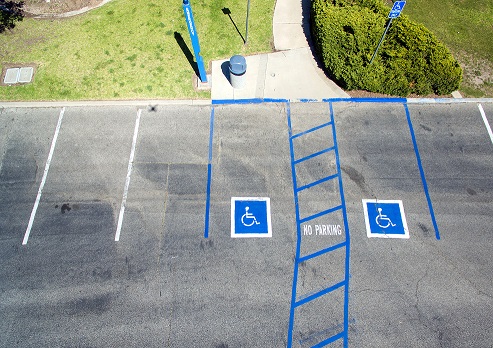 If you are an owner, landlord, or tenant of a property classified as a “public accommodation,” you have an obligation to understand and comply with the Americans with Disabilities Act (ADA) — a federal law designed to prohibit the discrimination of people with disabilities.
If you are an owner, landlord, or tenant of a property classified as a “public accommodation,” you have an obligation to understand and comply with the Americans with Disabilities Act (ADA) — a federal law designed to prohibit the discrimination of people with disabilities.
How does the ADA apply to property owners?
Title III of the ADA requires all private places of public accommodation be accessible for the disabled. Examples of public accommodations include privately owned, leased or operated facilities such as:
- Hotels
- Restaurants
- Retail merchants
- Doctors’ offices
The California Disabled Persons Act makes non-compliance with the ADA a violation of California civil rights, and enables people with disabilities to sue a violating business for damages. This could cost your business as much as $4,000 per violation.
Both federal and California state laws regarding disability accommodation affect property owners by establishing a continuing obligation to remove architectural barriers to ensure your business is accessible for the disabled. This includes existing barriers around entrances, bathrooms, and aisles — even those that might have predated the acts.
Who is liable for ADA violations?
Owners, landlords, and tenants can all be liable in the event of ADA non-compliance. Although a landlord may not shift liability for ADA compliance to its tenants, they can take steps to reduce any damages caused by a tenant’s violations. As a landlord, you may protect yourself by ensuring your lease:
- Clearly states that tenants must comply with the ADA and any relevant state and local regulation
- Requires the tenant to indemnify the landlord for any costs associated with ADA compliance
- Require the tenant to obtain insurance that will cover any ADA claims and defend those claims on behalf of the landlord
Although these clauses inserted into a landlord-tenant lease might cause concern for tenants, recent amendments to California Civil Code Section 1983 have shifted some burdens to the landlord. The following additional disclosures are required in all California commercial leases:
- Whether the property has been inspected by a California Certified Access Specialist (CASp) and if it passed or failed
- If inspected, the landlord must supply copies of the report to prospective tenants
- If a CASp inspection certificate has not been issued, certain statutory language must be included in the lease
- Prospective tenants have a right to rescind the lease if the report is not provided at least 48 hours prior to the lease’s execution, or based upon information contained in the report, up to 73 hours after the agreement
- The presumption that commercial landlords are responsible for correcting accessibility violations
By recognizing the risks associated with failing to comply with the ADA and implementing policies and procedures designed for equal access, owners, landlords, tenants, and property managers can minimize the liability and expense associated with preventable violations.
To understand your rights and opportunities to limit or prevent exposure to litigation, contact an attorney to review the issues related to your role as a property owner. At The Myers Law Group, our team of experienced and knowledgeable attorneys can walk you through the steps you need to take to ensure ADA compliance in your business or help you navigate and defend against alleged violations of the ADA.
For a consultation of your case, call us today at (949) 284-7878.






